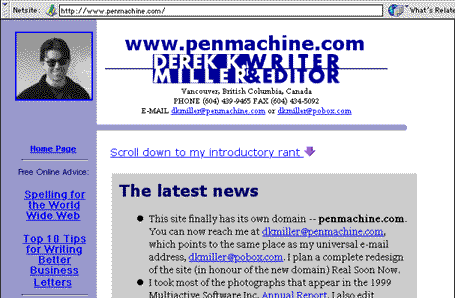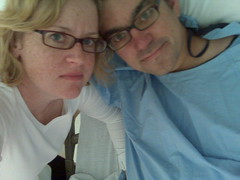

Penmachine
31 October 2008
And boo! to you too
We lucked out again this year: the pouring rain stopped
just before the kids headed out in their Halloween costumes. It's been a
busy night. Oop! There's the door again...
30 October 2008
Spooky black holes
Here is Bad Astronomy's list of ten things you don't know about black holes. I'd never heard of a low-density black hole, for instance.
28 October 2008
California's Proposition 8 is stupid
It has no direct legal bearing on us here in Canada, but still, the existence of California's Proposition 8, which asks the state's voters to ban same-sex marriage in the state's constitution next week, depresses me. Here in northern commie land, gays and lesbians have had the explicit legal right to get married since 2005, and you know what?
Canadian society has not collapsed. Heterosexual marriages haven't spontaneously combusted into invalidity—at least, not the ones that wouldn't have anyway. Gay people haven't been out on huge "recruiting" drives at local evangelical churches. Things are pretty much the same as before. Alas, a few of those married gay couples have even gotten divorced, as you'd expect.
So I like the point that this video (via Bad Astronomy) makes, by replacing "same-sex marriage" in a Californian pro–Proposition 8 ad with "interracial marriage":
Gay marriage doesn't seem to have destroyed People magazine either. So if you're a California voter who reads my blog and on whom I might have any influence—a pretty small number of people, I'd guess—then next week, in addition to voting for Obama (what? is that surprise from me?), please vote No on Proposition 8. It's unnecessary, and doesn't deserve the ink.
If I seem meddlesome here, hey, if any of my American readers had given me advice on how to vote in the Canadian election earlier this month, I would at least have considered your opinion. But none of you did!
Canadian society has not collapsed. Heterosexual marriages haven't spontaneously combusted into invalidity—at least, not the ones that wouldn't have anyway. Gay people haven't been out on huge "recruiting" drives at local evangelical churches. Things are pretty much the same as before. Alas, a few of those married gay couples have even gotten divorced, as you'd expect.
So I like the point that this video (via Bad Astronomy) makes, by replacing "same-sex marriage" in a Californian pro–Proposition 8 ad with "interracial marriage":
Gay marriage doesn't seem to have destroyed People magazine either. So if you're a California voter who reads my blog and on whom I might have any influence—a pretty small number of people, I'd guess—then next week, in addition to voting for Obama (what? is that surprise from me?), please vote No on Proposition 8. It's unnecessary, and doesn't deserve the ink.
If I seem meddlesome here, hey, if any of my American readers had given me advice on how to vote in the Canadian election earlier this month, I would at least have considered your opinion. But none of you did!
27 October 2008
The doom of the American car company
Via Brian Chin, the Wall Street Journal's "How Detroit Drove Into a Ditch"
is a succinct history of why General Motors, Ford, and Chrysler are
fumbling towards bankruptcy while the 16 U.S.-based vehicle factories
run by foreign firms like Toyota, Nissan, Honda, Hyundai, Mercedes-Benz,
and Volkswagen are profitable and prosperous:
Seeing one or more of the Detroit Three collapse would be sad, but personally I'd have no reason to miss them.
...to thrive, instead of just survive, Detroit will have to use the brains of its workers instead of just their bodies, and the [United Auto Workers] will have to allow it. Two weeks ago some automation equipment broke down at the Honda factory in Marysville, Ohio, but employees rushed to the scene and devised a temporary solution. There were no negotiations with shop stewards, no parsing of job descriptions. Instead of losing an entire shift of production, Honda lost just 150 cars.I don't think many people of my generation favour American brands when considering a new car. For me, GMs, Fords, and Chryslers are far from the top of the list: generally, when I sit in a new car built by one of those companies, something about it often feels cheap, which isn't the case with their Asian or European competitors' vehicles. Our Ford Focus has been a decent station wagon over the past seven years, but our Toyota Echo, which was much cheaper, has needed far fewer repairs.
Seeing one or more of the Detroit Three collapse would be sad, but personally I'd have no reason to miss them.
Happy eighth birthday, blog
 Today marks eight years since this site first became a blog, back on October 27, 2000. That's the day I started using Blogger—long
before Google bought it—to publish updates here, instead of doing them
manually in a text editor. (I did so on the recommendation of my friend Alistair—who was also standing next to me in the photo I cropped down as my portrait at the time.) Believe it or not, I'm still using Blogger to run the site, although I don't host it on Blogger's servers, and I make my own templates.
Today marks eight years since this site first became a blog, back on October 27, 2000. That's the day I started using Blogger—long
before Google bought it—to publish updates here, instead of doing them
manually in a text editor. (I did so on the recommendation of my friend Alistair—who was also standing next to me in the photo I cropped down as my portrait at the time.) Believe it or not, I'm still using Blogger to run the site, although I don't host it on Blogger's servers, and I make my own templates.That day back in 2000 was also a little over seven months after I first registered the penmachine.com domain—in the three years before that, I'd been publishing at various obscure URLs owned by my ISP and others. However, the alias www.pobox.com/~dkmiller will still get you here, as it always has. So, courtesy of the Wayback Machine, here are some looks back:
- Take a look at this site in September 2000, before I blogified it. I also have a screenshot of an even earlier version, plus a preserved HTML archive from 1998.
- You can also examine roughly how it looked in 2001, 2002, 2003, 2004, 2005, 2006, 2007, and 2008. You know, this blog hasn't changed as much as I might have thought.
- As far as I can tell, the most popular thing I've ever written here is my 2005 article about buying a cheap guitar, which remains my most-viewed page more than three years after I published it, and more than two years after I last made any updates to it. If you post stuff on the web, that shows you why you should avoid breaking links.
- To reinforce that, this month 30 people took at look at my earliest blog archive, and 140 people (!) read my spelling article, which was pretty much the first thing I ever published on the Web, back in 1997. Earlier this year, an editor colleague of mine finally spotted a typo in the piece—even though it had been online and widely read for 11 years. So I fixed it.
- In the past eight years, I'm not sure if I've had visitors from every country in the world, but I have had at least one each (and probably more, given that many people's browsers don't reveal their location) from Namibia, Greenland, Tajikistan, Vanuatu, and Nicaragua, among others.
- My biggest traffic spikes have come via Jason Kottke and John Gruber, which is little surprise if you know their sites.
26 October 2008
Photographers and art
My family are not art collectors by any means, but over the
years my wife and I have acquired some original prints by artists of
varying degrees of renown—some from the artists directly. Today she
dropped by Vancouver's Portobello West fashion and art market, where among other things she picked up two photos of koi from a booth set up by North Vancouver–based Jeff Maihara.
The pictures fit well with some of the other artwork we already have in our house, but we haven't figured out exactly where to put them yet. Vancouver produces some fine photographers, including our friends Alastair, Kris, and Duane. I hadn't heard of Jeff before, so it's nice to find another one.
Oh, and on a completely unrelated note, Bill in Omaha had a weird dream about me and my bandmate Mark.
The pictures fit well with some of the other artwork we already have in our house, but we haven't figured out exactly where to put them yet. Vancouver produces some fine photographers, including our friends Alastair, Kris, and Duane. I hadn't heard of Jeff before, so it's nice to find another one.
Oh, and on a completely unrelated note, Bill in Omaha had a weird dream about me and my bandmate Mark.
25 October 2008
The living part
 I think some of you might have garnered the wrong impression from my previous entry. I'm not
giving up on conventional cancer treatment, nor am I resigned to dying
soon. Rather, I'm considering my choices more carefully, trying some new
things, and making a stronger cost-benefit analysis of the options
presented to me.
I think some of you might have garnered the wrong impression from my previous entry. I'm not
giving up on conventional cancer treatment, nor am I resigned to dying
soon. Rather, I'm considering my choices more carefully, trying some new
things, and making a stronger cost-benefit analysis of the options
presented to me.Until September, the conventional treatments I'd been taking—chemotherapy, radiation, surgery—still showed reasonable promise of putting my cancer into remission, or shrinking it, or even (before we knew it had metastasized into my lungs) curing it. So it was worth trying everything, side effects and life-on-hold be damned. The surgery worked its magic: if the cancer cells hadn't found their way to my lungs first, I might very well be cancer-free by now from the skilled work of Dr. Phang and his team at St. Paul's Hospital. The radiation I'd had before that might even have helped.
But the chemo...well, those various poisons I've taken in 2007 and 2008 may very well have kept any further cancer from appearing in my intestines, but the tumours in my lungs are tough little fuckers, and have resisted being beaten down. Now I have to look at the new treatments I might have coming up, and decide whether their relatively low likelihood of zapping those same malfunctioning blobs of tissue are worth what I might have to suffer in taking them.
I mean, it's fine and noble to help cancer research, but I've already done that a couple of times. I might still do it this time, but even if I do, I'm prepared to bail out early if the side effects are too harsh or if it doesn't seem to be helping. I'm also meeting with a doctor at Inspire Health next Friday to talk about other stuff: nutrition, exercise, relaxation, complementary treatments, and so on.
This is a new phase of how I understand my disease, and how my family and I live with it, one I feel good about because I'm putting a priority on the living part.
23 October 2008
To fight, or to live
 My
wife Air is wiser than me—more self-aware, better at thinking long
term. A big reason I'm not that way is because, until I developed cancer
at the beginning of last year, I'd never had to face big, difficult
decisions. I had a happy, stable childhood, did well in school, lucked
into good jobs, and found her. (More accurately, she found me. See what I
mean?)
My
wife Air is wiser than me—more self-aware, better at thinking long
term. A big reason I'm not that way is because, until I developed cancer
at the beginning of last year, I'd never had to face big, difficult
decisions. I had a happy, stable childhood, did well in school, lucked
into good jobs, and found her. (More accurately, she found me. See what I
mean?)Even after my cancer diagnosis, I've followed the path I've usually chosen in life. That is, I've coasted, and let gravity take me where it will. My treatment decisions have been easy ones. Follow doctors' orders. Get tests, have surgery, take chemotherapy and radiation, more tests, more surgery, more chemo, more chemicals, more treatments, coming up on two years' worth now.
On hold
The surgeries in my intestines were successful, but small nodules of cancer spread to my lungs anyway, and the chemical medicines for those haven't worked so well. The metastases continue to grow slowly, regardless of what my doctors have thrown at them.My latest surgery a couple of weeks ago was my first that wasn't about attacking the cancer. It was simply to make my life better, to reconnect my intestines so that I'm no longer walking around with an ileostomy bag of poop glued to my belly. Now I have another new, healing scar, and I'm re-learning how to use the bathroom the way I used to.
That surgery prompted my wife to have a talk with me a couple of days ago. With her wisdom, and her insight, she's seen what I've been doing in my mind for the past couple of years. I've been treating my cancer as something to fight with everything the doctors and nurses can offer, no matter how sick they make me, hoping that one of those weapons will kill it so I can move on with my life. I've put my life on hold—and my family's life too, hers and our daughters'—to fight the disease, treating it as a phase to get through before I return to something normal.
Experiment, not treatment
Except that's not how it's going. The next treatment the B.C. Cancer Agency is offering me is a Phase I clinical trial of chemotherapy agents. That means it's a very early human test of the drugs involved, not even designed to find out whether the drugs work to fight cancer, but rather how patients like me respond to them—what levels they appear at in my bloodstream, how they interact, what side effects they produce. In other words, we've run out of the conventional therapies, and we're moving on to experimental ones that have a very small chance of working. They are, however, likely to produce side effects, even if they aren't effective in shrinking my cancer.Air made me ask myself—after almost two years on hold, most of which I've spent hammered down by those side effects, or recovering from surgery—how I want to live my life with cancer. Because that's what it looks like I'll have to do. We don't know how long that will be: months certainly, years quite possibly. All indications are that, like my diabetes, I'll have cancer for the rest of my life. It will probably be what kills me, whenever that is.
Yet since I stopped my last chemo treatments in September, I've felt good, verging on healthy, better than I have in ages. Therefore, much of what I've suffered through, especially recently, has been from the treatments, not from the disease. I thought that suffering was a necessary part of the fight. So I thought. But now it's time to make some real decisions.
Real decisions
Do I want to be part of this new Phase I trial, to contribute semi-altruistically to cancer research, spending many days at the Cancer Agency getting tests, taking pills every day, maybe feeling sick all the time and getting more strange skin rashes, perhaps even developing other weird side effects like elevated blood pressure, maybe for no reason that might actually get me better?Or do I want to look at something else, like Vancouver's Inspire Health Integrated Cancer Care, and the Callanish Retreats, to try different things and look at managing cancer instead of fighting it? Strange as it sounds, should I make cancer part of how I live my life, rather than something that stops me from living it?
When I heard about the trial yesterday, I assumed, almost unconsciously, that I'd proceed with it. But that's still coasting, just taking whatever the doctors serve up from a diminishing buffet. There are places I still want to go in my life, things I want to do, the husband and father I still want to be. Perhaps now is the time to go there, to do them, to be that, because I can't wait forever first.
I shouldn't waste my life trying win a fight that likely can't be won. I should take it off hold, and live it.
Labels: cancer, chemotherapy, death, family, ileostomy, inspirehealth, love, science, surgery, travel
22 October 2008
Get yer X-rays here
 Okay, this is weird (via Tris). It turns out that if you peel Scotch tape in a vacuum, the action generates small but significant amounts of X-ray radiation—enough, for example, to make an X-ray image of a finger.
Okay, this is weird (via Tris). It turns out that if you peel Scotch tape in a vacuum, the action generates small but significant amounts of X-ray radiation—enough, for example, to make an X-ray image of a finger.Keep in mind that this only happens in a vacuum, so your everyday uses of Scotch tape—in the air, in other words—pose no danger. But it is pretty bizarre, and something the Soviets apparently figured out more than 50 years ago. Some speculate that the phenomenon could lead to portable, battery-free X-ray machines powered by hand cranks or other muscle power for use in developing countries. Neat.
20 October 2008
Links of interest (2008-10-20):
- How to tell if the Iraq War has been won.
- Does the financial collapse mean the end of Libertarianism?
- Wonderful interviews with many legendary guitar players.
- Metallica's new album sounds better on vinyl.
19 October 2008
The shocking clarity of Colin Powell
In the upcoming American election, it's a pretty big deal
to have former Secretary of State and general Colin Powell, a
Republican, endorse Barack Obama, the Democratic nominee, for president:
Of course it's all over the news. But I'd like you to watch the video of his speech or, even better, read the transcript, then think about it a minute.
Notice how straightforward Powell's answers are. He doesn't dodge or prevaricate. He doesn't try to spin talking points or fire out sound bites, even about the Iraq War. When a reply needs detail, he provides it, and talks for some time, making an argument. When it needs simplicity, he offers it without extra padding. At the end, when a reporter asks if he's still a Republican, what is his answer—in its entirety? "Yes."
Such clarity in political speech is so rare that it is actually shocking. That people must be out of politics before they can really speak their minds this way is shameful. I'm sure many U.S. Democrats will applaud Powell for it, and many Republicans will excoriate him. But I'm glad he is self-secure and well respected enough that, to him, that obviously doesn't matter.
Notice how straightforward Powell's answers are. He doesn't dodge or prevaricate. He doesn't try to spin talking points or fire out sound bites, even about the Iraq War. When a reply needs detail, he provides it, and talks for some time, making an argument. When it needs simplicity, he offers it without extra padding. At the end, when a reporter asks if he's still a Republican, what is his answer—in its entirety? "Yes."
Such clarity in political speech is so rare that it is actually shocking. That people must be out of politics before they can really speak their minds this way is shameful. I'm sure many U.S. Democrats will applaud Powell for it, and many Republicans will excoriate him. But I'm glad he is self-secure and well respected enough that, to him, that obviously doesn't matter.
18 October 2008
Getting podPress to work with WordPress 2.6
NOTE: This post is a pure podcasting nerd-fest. If that's not your thing, feel free to move on.
I help run two podcasts published using the fine open-source blogging software WordPress. A few months ago, when the latest version of WordPress, 2.6, came out, I immediately upgraded one of the sites, Inside Home Recording (IHR). Whoops. Mistake. The new version broke the key podcasting plugin we use, podPress.
So I held off upgrading the other podcast, Lip Gloss and Laptops, keeping it at WordPress 2.5 to maintain compatibility while waiting for a podPress upgrade. Over at IHR, where it was too late, I instead installed the new Blubrry Powerpress podcasting plugin as a substitute.
So I wanted podPress back, but for various reasons the developer has been very busy, had his site forums hacked by spammers, and has otherwise been unable to update his free plugin to work with WordPress 2.6 for several months now. I couldn't wait any longer.
But it turns out the fix is a simple one. The new WordPress feature that seems to be interfering with podPress is post revisions, which track changes to posts. Cool, but I don't use it. The No Revisions plugin turns off that feature, and voila!, podPress works again too.
So I installed No Revisions at both the IHR and Lipgloss sites, deactivated Powerpress at IHR, upgraded to the latest WordPress at Lipgloss (using the great WordPress Automatic Upgrade plugin), and everything seems to be working fine. Page load times have speeded up, simple players are available for all podcast files, and I'm back where I want to be.
If you're a podcaster with similar problems or have been postponing your WordPress upgrade, this solution might work for you too.
I help run two podcasts published using the fine open-source blogging software WordPress. A few months ago, when the latest version of WordPress, 2.6, came out, I immediately upgraded one of the sites, Inside Home Recording (IHR). Whoops. Mistake. The new version broke the key podcasting plugin we use, podPress.
So I held off upgrading the other podcast, Lip Gloss and Laptops, keeping it at WordPress 2.5 to maintain compatibility while waiting for a podPress upgrade. Over at IHR, where it was too late, I instead installed the new Blubrry Powerpress podcasting plugin as a substitute.
UPDATE 21 Oct 2008: For those of you
using the Blubrry Powerpress plugin, there is a new update that fixes
the problem I talk about below, which Angelo discusses in the comments.
His summary: "We've just made a new version (0.4.0)
which now displays an image in place of loading quicktime files. We use
a simple blubrry play icon as the default play image, but you can
provide your own play image by adding a custom define to your
wp-config.php that includes the URL where your custom play image is
located. This new option is documented at the bottom of the Advanced Tweaks page for the Blubrry Powerpress plugin." Kudos to the Blubrry team.
Now, Powerpress is fine. It does the job, and recognizes most of the
detailed settings from podPress, but it doesn't offer as fine-grained
control, and has one major problem: for non-MP3 podcasts, such as the
Enhanced AAC files we use at IHR, it puts up a little movie player (as
does podPress), but in doing so (unlike podPress) it also starts loading the podcast file whenever someone visits the web page. For pages with a lot of podcast episodes on them (like our AAC episode index, or even our home page), that really slows down page load times, wastes bandwidth, and throws off audience statistics.So I wanted podPress back, but for various reasons the developer has been very busy, had his site forums hacked by spammers, and has otherwise been unable to update his free plugin to work with WordPress 2.6 for several months now. I couldn't wait any longer.
But it turns out the fix is a simple one. The new WordPress feature that seems to be interfering with podPress is post revisions, which track changes to posts. Cool, but I don't use it. The No Revisions plugin turns off that feature, and voila!, podPress works again too.
So I installed No Revisions at both the IHR and Lipgloss sites, deactivated Powerpress at IHR, upgraded to the latest WordPress at Lipgloss (using the great WordPress Automatic Upgrade plugin), and everything seems to be working fine. Page load times have speeded up, simple players are available for all podcast files, and I'm back where I want to be.
If you're a podcaster with similar problems or have been postponing your WordPress upgrade, this solution might work for you too.
17 October 2008
Links of interest (2008-10-17):
Sorry, I'm not keeping very good track of my sources for these:
- Eighty-four variations of the iconic Obama "HOPE" poster.
- "...incentive plans based on measuring performance always backfire. Not sometimes. Always."
- "If I have grown more cynical in recent years, it is travel, I think, that has pushed me in this direction. Exploring other parts of the world is beneficial in all the ways it is typically given credit for [...] But traveling can also burn you out, suck away your faith in humanity. You will see, right there in front of you, how the world is falling to pieces."
- A $15 USB controller shaped like the classic Atari 2600 joystick.
- Fabulous video of the recent SpaceX launch—the first successful commercial orbital rocket launch ever. If you're interested, here's a Google Maps satellite photo of the launch facility in the South Pacific, midway between Hawaii and New Guinea.
- Why we can't imagine what it's like to be dead.
- Blues guitar legend Robert Johnson died 70 years ago. Someone might have recently discovered a new photograph of him, one of at most a handful existing.
16 October 2008
Links of interest (2008-10-16):
I'm still doped up on Tylenol 3's and pretty tired post-surgery,
so am not up for much thinking or original posts. I'm also
contemplating email bankrupcy again, mere months after my last one, as
my inbox creeps up to 800 once more. Sigh. Anyway, here's some
interesting stuff:
- What if all movies had cell phones? (There's a good reason No Country for Old Men was set in 1980, by the way.)
- A worthy quote in this electional season: "I like to pay taxes. With them I buy civilization." - Oliver Wendell Holmes (though it may be a folksier recasting of "Taxes are the price we pay for a civilized society").
- "Hey news executives! Try this newsroom pop quiz: Give each staff member a pencil and tell everyone to stop what they're doing and write out the tag that creates a hypertext link." (via Dan)
- Andrew Sullivan rounds up quotes from a number of last night's press and blogger reactions to the final McCain-Obama debate.
- Also from Sullivan, it's a bit sad how well this video reflects the approach of the McCain campaign right now.
- While Leica's upcoming S2 camera is quite large (especially the lenses) for a digital SLR, it has a medium-format size sensor, meaning that it is smaller and probably more ergonomic than most of its direct competitors, and that even the rumoured €10,000–20,000 price isn't as insane as it sounds. Nevertheless, the cost of a reasonably complete S2 system when it's released next year will rival that of a condominium. It also bodes well for future "lower end" (for Leica, at least) cameras from this legendary manufacturer.
- What's it like to write other people's term papers for a living? (via Kottke)
- The web comic Basic Instructions makes me laugh almost every single time a new one comes out.
- Vancouver locals Buzz Bishop and Darren Barefoot accurately summarize the Canadian election held this week, in which nothing much changed. The result (as I discussed earlier) bodes poorly for our country's environmental and climate policy, which is one subject we can't afford to waste time on, unfortunately.
Labels: environment, film, leica, linksofinterest, movie, news, photography, politics, school, telecommunications, web, writing
15 October 2008
Home from surgery
 I'm
back home now. The surgery to reconnect my intestines into proper
working order (almost a year and a half after my initial cancer-induced disconnection surgery) went well, and I am recovering about as fast as could be expected.
I'm
back home now. The surgery to reconnect my intestines into proper
working order (almost a year and a half after my initial cancer-induced disconnection surgery) went well, and I am recovering about as fast as could be expected.To no one's surprise, and I'm tired and sore and plan to do a bunch of sleeping rather than blogging, email, and so forth. Overall, it went very well, and I'm doing my best to avoid having to go back into the hospital with a blockage like a did last time.
Okay, I have to lie down now.
09 October 2008
Grad up the mountain
 It's
been many years since I attended a university convocation ceremony, but
I went to one today. My cousin Tarya graduated with a Bachelor's degree
from Simon Fraser University, which I can see atop Burnaby Mountain from our front window.
It's
been many years since I attended a university convocation ceremony, but
I went to one today. My cousin Tarya graduated with a Bachelor's degree
from Simon Fraser University, which I can see atop Burnaby Mountain from our front window.I was glad to be able to make it, before my surgery tomorrow. (I've been on a liquid diet all day, so I had to miss out on the family lunch afterwards.) It's been almost 20 years since I graduated from UBC, and Tarya's the first in our family to get a university degree since then—and since I'm an only child, my cousins are as close to siblings as I have. She and her longtime boyfriend T.J. also just announced their engagement too, so it's an exciting month for her.
Exciting for many of us, in fact. My next excitement is that I'll be in hospital for most of the next week, so don't expect much in the way of updates here.
08 October 2008
Nearly time for another surgery
In less than two days, I have surgery to reverse my ileostomy
and reconnect my intestines into proper working order. It happens
sometime on Friday, October 10. Having had four surgical procedures
(three under general anaesthetic) since early 2007, I'm pretty blasé
about the procedure itself. I'm a little apprehensive about the pain and
recovery, which will likely have me in St. Paul's Hospital for about a
week, and on soft foods for awhile after that.
Tomorrow I'll consume nothing but fluids in preparation: I've already had my last solid meal for awhile. I'll go see my cousin graduate from university in the morning, do various chores after that, get ready for the hospital in the afternoon, and then call to find out my surgery time.
It's still a bit like getting ready for a car accident you know is coming, so the nerves are there. But this time, I've been through the same kind of collision before. I know morphine works. I'll be renting a TV. But damn, there's still no wireless Internet at the hospital—I wish they'd get on that.
Tomorrow I'll consume nothing but fluids in preparation: I've already had my last solid meal for awhile. I'll go see my cousin graduate from university in the morning, do various chores after that, get ready for the hospital in the afternoon, and then call to find out my surgery time.
It's still a bit like getting ready for a car accident you know is coming, so the nerves are there. But this time, I've been through the same kind of collision before. I know morphine works. I'll be renting a TV. But damn, there's still no wireless Internet at the hospital—I wish they'd get on that.
07 October 2008
London this morning
 When I was a kid, financial news was perhaps the most boring thing in the whole world, except maybe the TV farm report
that frustratingly preceded early-morning cartoons. (That farm news
seems to have disappeared here in Vancouver. Even the telephone weather
line I used to check, pre-web, before bicycling to university each day,
no longer reports hay drying conditions in the summer.)
When I was a kid, financial news was perhaps the most boring thing in the whole world, except maybe the TV farm report
that frustratingly preceded early-morning cartoons. (That farm news
seems to have disappeared here in Vancouver. Even the telephone weather
line I used to check, pre-web, before bicycling to university each day,
no longer reports hay drying conditions in the summer.)I can't say that my opinion of money and business news has changed much in the intervening decades. It's usually a snore-fest of inscrutable numbers, impenetrable market analysis, and a parade of old guys in dark suits and ties. (Yeah, I hire an accountant to sort out my taxes after my perfunctory sorting of income and expenses each year.) Despite the impacts of global markets on everyone's ability to get a job, buy things, use credit, and so on, it always seemed so disconnected from my daily life that I just couldn't get interested.
Well, these past few weeks have certainly removed world financial news from the "boring" category, but I still can't pretend to understand what's going on very well. If you're like me, I strongly recommend This American Life's recent audio episode "Another Frightening Show About the Economy." Before you listen to that, however, I suggest you check out its predecessor from May 2008, "The Giant Pool of Money," which dissects the American sub-prime mortgage disaster that preceded the current credit crisis.
Both shows do an amazing job of explaining terminology such as "commercial paper," "credit default swaps," "leverage," "financial instruments," and other stuff I never bothered to learn about, and of putting together the chain of insanity that led to today's bizarro state of affairs, where supposedly laissez-faire conservative governments around the world are desperately spending hundreds of billions of dollars to nationalize banks and insurance companies. Even if you work in the finance industry, are a savvy investor, or otherwise have a handle on this stuff, check out the two shows. You'll likely learn something anyway.
UPDATE: Here's an even more direct explanation (via Kottke).
06 October 2008
A little miracle in your pocket
 Any
technology you grow up with seems less impressive than it is, because
you take it for granted. Air travel, television, the Internet,
vacccines, eyeglasses, plastic, treated municipal drinking water,
central heating, the wheel—if it became widespread before you were born,
chances are you hardly give it a second thought.
Any
technology you grow up with seems less impressive than it is, because
you take it for granted. Air travel, television, the Internet,
vacccines, eyeglasses, plastic, treated municipal drinking water,
central heating, the wheel—if it became widespread before you were born,
chances are you hardly give it a second thought.Mobile phones are becoming like that, but Rich Mogull in TidBITS this week makes a good point:
...after you learn a little more about the inside of the [cellular telephone] system, maybe, just maybe, you'll be a little less irritated the next time you battle to make a simple call. [...] If you think about it, you are basically wandering the planet with a tiny radio in your pocket, but by calling a single number anyone can track you down in seconds.For almost the entirety of human history until the past decade or two, that would be miraculous, something available only to Captain Kirk and his fictitious future-centuries cohorts. Now we're cheesed off when it doesn't happen instantly.
05 October 2008
How left-wing Canada elects a right-wing government
We Canadians are having an election too, on October 14, a
few weeks before our southern neighbours in the U.S.A. By the standards
of most countries in the world, Canada's political climate is a social democratic
one, particularly on social and moral issues. (By the somewhat skewed
perspective of modern American politics, therefore, we probably all seem
like we're Shining Path
guerrillas.) In the last election in 2006, about 36% of the population
voted for the Conservatives, the centre-right party that currently forms
a minority government in Parliament.
What it means is that even when we elected a conservative (for us) government, 64% of Canadians still voted for parties more left-wing than that, from the centre-left Liberals to the democratic socialist New Democratic Party (NDP). Even the Bloc Québecois, whose primary platform is Québec independence (or sovereignty, in Canadian politispeak) are left-leaning in their other policies, while the environment-angled Green Party—a more significant force in 2008 than two years ago—is conservationist, rather than conservative.
I recall, for example, the early-’90s era when the federal Reform and Progressive Conservative ("Tory") parties split the vote on the right, so that even with the Bloc dominating in Quebec, the Liberals maintained power for a decade by winning a majority of seats elsewhere. At the same time, provincially here in British Columbia, the formerly dominant Social Credit Party, B.C. Reform (a brief experiment), and the Liberals all divided the centre-right and right vote, keeping the provincial NDP in power over a couple of election cycles.
Those situations ended a few years later when, respectively, Reform and the Tories merged into the current Canadian federal Conservative Party, and the various centre-right and right-wing parties in B.C. coalesced around the B.C. Liberals, who form our current provincial government. But that situation also ensures that no elected party can become too extreme: in the Conservative Party, for example, the far-right social conservatives (many of whom used to belong to the Reform Party) form only a fraction of the government's caucus, and if they tried to impose their views on the legislature as a whole, they could generate another schism that loses them the next election.
Unfortunately for lefties like me, however, in this federal election it is the left wing that is split, among the NDP, Greens, Bloc, and Liberals. That is unusual in Canadian history—the Liberals are frequently nicknamed our "natural governing party" because they have won so often overall. But as further evidence of a general left-wing bias in the Canadian electorate, the left has always been split since the rise of the NDP and its predecessor the Cooperative Commonwealth Federation (CCF) more than 60 years ago, and yet the centre-left Liberals have still been in power most of that time. However, in the 2008 election, the wider left split may have particularly dire, long-term real-world consequences.
The Conservatives are likely to win again, perhaps with a majority instead of a minority of seats in Parliament, but with only a minority of the overall vote. In general I could live with that. But critically, while the more socially regressive ideas of Prime Minister Stephen Harper (a former Reform Party MP) are reined in by his party's "big tent," his government is the worst option on environmental issues. Only the Liberals—not even the Greens!—have proposed a carbon tax, which I think will be necessary to shift our energy usage. But even that comes after more than ten years of inaction on climate change when it counted most, when the Liberals were actually in power in the '90s and early 2000s.
Voting NDP has been an easy choice for me ever since I became eligible 20 years ago in this riding—I know my vote is not “wasted” (NDP founder Tommy Douglas was an MP here too at one point, so his party has always been a strong contender), and as a lefty I agree with the party platform on many issues. Were I in a different riding, I might vote more strategically, choosing Green or Liberal. As it is, my decision was simple, because my riding and national interests align.
Yet because of our current political morass, I think we stand to make poor national policy decisions on climate change, when time is running short to make the right ones.
What it means is that even when we elected a conservative (for us) government, 64% of Canadians still voted for parties more left-wing than that, from the centre-left Liberals to the democratic socialist New Democratic Party (NDP). Even the Bloc Québecois, whose primary platform is Québec independence (or sovereignty, in Canadian politispeak) are left-leaning in their other policies, while the environment-angled Green Party—a more significant force in 2008 than two years ago—is conservationist, rather than conservative.
Hidden coalitions
Unlike many other democracies, especially those with proportional representation systems that our British-style parliamentary system lacks, Canada really doesn't favour formal multi-party coalition governments. However, we often get them, in effect, by other means. That occurs when several left- or right-leaning parties merge to regain power after living in a vote-splitting wilderness for a few years.I recall, for example, the early-’90s era when the federal Reform and Progressive Conservative ("Tory") parties split the vote on the right, so that even with the Bloc dominating in Quebec, the Liberals maintained power for a decade by winning a majority of seats elsewhere. At the same time, provincially here in British Columbia, the formerly dominant Social Credit Party, B.C. Reform (a brief experiment), and the Liberals all divided the centre-right and right vote, keeping the provincial NDP in power over a couple of election cycles.
Those situations ended a few years later when, respectively, Reform and the Tories merged into the current Canadian federal Conservative Party, and the various centre-right and right-wing parties in B.C. coalesced around the B.C. Liberals, who form our current provincial government. But that situation also ensures that no elected party can become too extreme: in the Conservative Party, for example, the far-right social conservatives (many of whom used to belong to the Reform Party) form only a fraction of the government's caucus, and if they tried to impose their views on the legislature as a whole, they could generate another schism that loses them the next election.
Flipping the split
And so we have a governing party whose members often disagree profoundly with many of the laws over which they preside. This is a country of legalized gay marriage, socialized medicine, no restrictions on abortion, minimal overt religious influence over politics, wealth redistribution among the provinces by the federal bureaucracy, institutionalized bilingualism and multiculturalism, and one of the larger immigration rates in the developed world. Yet our Conservative government dares not alter those tenets in any fundamental way.Unfortunately for lefties like me, however, in this federal election it is the left wing that is split, among the NDP, Greens, Bloc, and Liberals. That is unusual in Canadian history—the Liberals are frequently nicknamed our "natural governing party" because they have won so often overall. But as further evidence of a general left-wing bias in the Canadian electorate, the left has always been split since the rise of the NDP and its predecessor the Cooperative Commonwealth Federation (CCF) more than 60 years ago, and yet the centre-left Liberals have still been in power most of that time. However, in the 2008 election, the wider left split may have particularly dire, long-term real-world consequences.
The Conservatives are likely to win again, perhaps with a majority instead of a minority of seats in Parliament, but with only a minority of the overall vote. In general I could live with that. But critically, while the more socially regressive ideas of Prime Minister Stephen Harper (a former Reform Party MP) are reined in by his party's "big tent," his government is the worst option on environmental issues. Only the Liberals—not even the Greens!—have proposed a carbon tax, which I think will be necessary to shift our energy usage. But even that comes after more than ten years of inaction on climate change when it counted most, when the Liberals were actually in power in the '90s and early 2000s.
Strategy and environment
With our non-proportional parliamentary system, many Canadians vote strategically. I cast my ballot in the advance poll this weekend, but I’m in a bit of an unusual situation, living in the Burnaby-Douglas riding long represented by the NDP’s Svend Robinson and, since his theft-related retirement, by his former assistant Bill Siksay. Both have been heavily involved in the local community, outspoken in Parliament (Svend notoriously so), and elemental in their party’s platform decisions.Voting NDP has been an easy choice for me ever since I became eligible 20 years ago in this riding—I know my vote is not “wasted” (NDP founder Tommy Douglas was an MP here too at one point, so his party has always been a strong contender), and as a lefty I agree with the party platform on many issues. Were I in a different riding, I might vote more strategically, choosing Green or Liberal. As it is, my decision was simple, because my riding and national interests align.
Yet because of our current political morass, I think we stand to make poor national policy decisions on climate change, when time is running short to make the right ones.
03 October 2008
Damn, that's interesting
My friend Jeff pointed me to the site Damn Interesting,
which somehow I hadn't heard about before. But it's exactly what it
says it is, so I've added it to my feed subscriptions and my blogroll.
And yeah, the colonoscopy went fine. Nothing to report, and the drugs were good enough that I don't remember a thing about the procedure.
And yeah, the colonoscopy went fine. Nothing to report, and the drugs were good enough that I don't remember a thing about the procedure.
01 October 2008
I'll be indisposed
I'm having another colonoscopy
on Thursday, my first in more than a year and a half. It's in
preparation for surgery next week to reconnect my intestines so I can
get rid of the bag of poop I've had to keep glued to my belly since the
summer of 2007. So I won't be posting here tomorrow, I don't think.
And you know, in the scheme of what I've been through in the past couple of years, a colonoscopy is nothing. If you're over 50 or (like me, it turned out) are otherwise at risk for colorectal cancer, go get one. They give you good drugs, so you won't mind.
In the meantime, check out 50 images in honour of NASA's 50th birthday, via Bill.
And you know, in the scheme of what I've been through in the past couple of years, a colonoscopy is nothing. If you're over 50 or (like me, it turned out) are otherwise at risk for colorectal cancer, go get one. They give you good drugs, so you won't mind.
In the meantime, check out 50 images in honour of NASA's 50th birthday, via Bill.
I'm interviewed about film photography
 Last week fellow Canadian podcaster John Meadows, whose show is called "On the Log," interviewed me about my recent return to dabbling in film photography.
Last week fellow Canadian podcaster John Meadows, whose show is called "On the Log," interviewed me about my recent return to dabbling in film photography.John's episode 38 (MP3 file) is titled "Film at 11." I talk about how I now approach making black and white pictures, as well as the cross-processed colour photographs I've taken in the past couple of months. Plus John and I discuss other differences between film and digital photography for archiving and backup.
The podcast is a good corollary to my recent talk at Vancouver's PhotoCamp and my Camera Works series here on the blog.




No comments:
Post a Comment